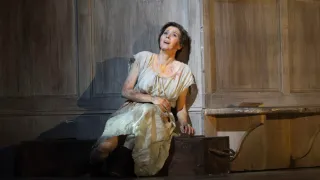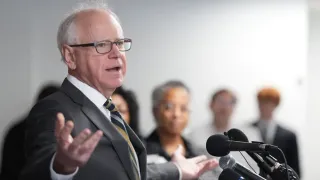October 10, 2019
Trump's Firewall Holds Solid on Fox News' Prime Time
David Bauder READ TIME: 4 MIN.
Critics of President Donald Trump who wonder about the tenacity of his supporters need only to spend three hours with Fox News Channel's headliners to get an idea why.
On his most influential venue, Trump's firewall remains secure.
Tuesday night in prime time, Tucker Carlson referenced "impeachment insanity." Sean Hannity said the president's opponents are involved in "insane, obsessive, compulsive, psychotic witch hunts." A guest on Laura Ingraham's show called the whistleblower who reported on Trump's conversation with the Ukrainian leader a suicide bomber.
Those three hosts reach an estimated 3 million to 4 million people each weeknight – the most-watched lineup on cable television – with a full-throated defense of the president as Democrats in the House pursue an impeachment inquiry.
The closest thing to doubt expressed by one of Fox's prime-time hosts came last week when Carlson wrote a column for the web site Daily Caller with his co-founder Neil Patel. They wrote that Trump should not have asked Ukraine to investigate former Vice President Joe Biden and that "there's no way to spin this as a good idea."
Carlson has yet to repeat that criticism on his Fox show. Like he did in the column, he has opposed impeachment. The big story at rival news networks Tuesday was the administration's letter to the House saying it would not cooperate with the inquiry, but Carlson played it in the last half of his show, when he interviewed Republican U.S. Rep. Devin Nunes.
Ingraham was the only one of the three anchors to lead her broadcast with the story and said the White House counsel had made a strong argument.
"This non-impeachment impeachment is not a constitutional undertaking," Ingraham said. "It's a political hit job, exactly what our founders did not want for our Republic."
She brought Trump lawyer Rudolph Giuliani and commentator Joseph diGenova on to criticize the impeachment effort. DiGenova called whistleblowers who have exposed Trump's behavior "suicide bombers that the Democrats unleashed on the democratic process."
"You mean political suicide bombers, before we start getting messages," Ingraham cautioned, apparently worried the remark was too inflammatory.
But she quickly added that people should "get inside the humor" of what he said.
Hannity's top-rated show is an often-breathless account of alleged nefarious activities by Trump's opponents, in a type of verbal shorthand with some references familiar only to his regular viewers. Trump, he said, is the victim of several "coup attempts."
"They went from one fishing expedition to another fishing expedition," he said. "Russia, Russia, Russia – that coup attempt. Then it was the tax return coup attempt. Then it was the Stormy Stormy coup attempt. Now it is the Ukraine, Ukraine, Ukraine coup attempt. That's all this is. They could not accept the will of the people – insane, obsessive, compulsive, psychotic witch hunts rooted in rage and a lack of connection to the reality that they lost."
During an appearance on Hannity's show earlier this month, Geraldo Rivera suggested his host was keeping Trump afloat and referenced an era when there was no Fox News Channel.
"If it wasn't for your show, Sean, they would destroy him absolutely," Rivera said. "You're the difference between Donald Trump and Richard Nixon."
Hannity's show reached an average of 3.28 million people each weeknight in July, August and September, according to Nielsen Media Research. Carlson averaged 3.08 million viewers and Ingraham had 2.63 million.
Fox has received attention recently for other personalities who have given Trump a hard time: veteran journalist and Sunday host Chris Wallace, daytime host Shepard Smith and, increasingly, commentator Andrew Napolitano. Yet Napolitano doesn't have a regular show on the network and while Smith leads other cable networks in the ratings, his audience is roughly a third of Hannity's since fewer people watch TV during the day.
The Pew Research Center, in a 2017 survey, found that 40% of Trump voters listed Fox News Channel as its main source of election news. No other media outlet reached even one-quarter of that level.
The prime-time lineup, along with the "Fox & Friends" morning show, is where Fox's influence is the greatest.
Like Trump, the three prime-time anchors showed Tuesday that they like to attach nicknames to perceived opponents. House Intelligence Committee Chairman Adam Schiff is a "prevaricating, priggish partisan," Ingraham said. Hannity called Biden "sleepy, creepy, crazy Uncle Joe."
All three shows highlighted a tweet by Democratic Rep. Alexandria Ocasio-Cortez calling for a discussion of incarceration policies, with Hannity calling her his "villain of the day."
Carlson's show spotlighted opponents to Trump's call for withdrawing troops from Syria, neglecting to include Senate Majority Leader Mitch McConnell or Republican Sen. Lindsey Graham, who made his criticism on Fox's airwaves.
Viewers can even follow the shows with the volume muted. Onscreen chyrons included "The Real Threat to Democracy: DC Establishment Trying to Block Prez's Plans"; "Leftist Media Freaks Out Over White House Letter" and "Life Under Dems: Free Health Care for the World."






